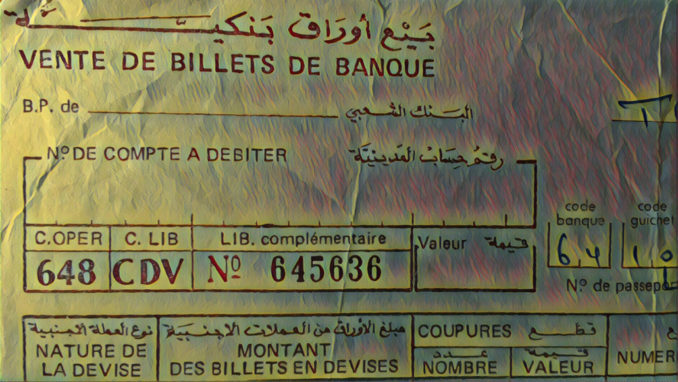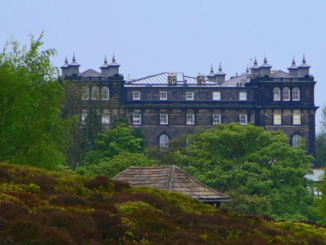
© Always Worth Saying, Going Postal 2020
And that was our routine. For the following nights, I would collect Tammy from the Royal Maroc, just after dark, take her to my establishment and pay her in. The night would be spent on surveillance photography, the maid girl Emile in tow. Just before sunrise, I would walk Tammy back to her hotel and then return to my own room, go to bed and sleep for much of the rest of the day. I might take an afternoon stroll, as a constitutional, down to the ferry terminal, or partway around the beach or, if feeling particularly brave, in the general direction of the Casbah.
En route, there was no shortage of street-side stalls from which to buy a little present for Emile. Always keep on the right side of the staff. Yes, at some point during the day, our little helper, despite her own tiredness, would let herself into my room to tidy. She would even change the sheets without waking me up. Upon rising, I’d notice my little cell cleaner, the linen fresh, the little gift for her gone.
I’d call for Tammy again at dusk, she having slept through most of the day, no doubt having also availed herself of the Royal Maroc’s superior facilities. Tammy remained bubbly, never threatening to sink into cabin fever, which I certainly would have, had it not been for my constitutionals and familiar Emile’s constant nearby presence.
A pattern emerged to the nights as well. The same people, cars, taxis, regulars and voyeurs, plus the curious who snook there and snook away again without partaking, appeared at the notorious dock wall. Like chess pieces, the different types had different moves. From night to night, characters began to emerge, personalities to attach to them. We gave them nicknames, amongst others, the Fat Guy, the Fog, Hat.
One mid-afternoon, following an ordinary night and an uneventful nap, I stepped past my accommodation’s bead curtain and onto the street for a stroll. Emile was on the other side of the doorway where the broken paving blurred into the road, sweeping things down the gutter with a straw brush. Not so much cleaning, more massaging dirt to a neighbouring property.
In the effortless way in which women take control of such things, as if leading me to the tether by a ring through the nose, she handed me the brush, leaving me stranded, stood there not knowing what to do, while she popped inside.
A few moments later she returned, spruced up. Wearing her favourite blouse, she flattered me by having finished it off with two of the little presents that I had left for her, a headscarf and a pair of sandals, both of which were finished in gold trim.
Three’s a crowd. She relieved me of the sweeping brush and left it propped inside the doorway, just out of sight. Unspeaking, she linked my arm and marched me down the slope towards the harbour and then to the right, along the promenade, beside the railway sidings which formed the first part of the crescent shape of Tangiers’ magnificent beachfront.
We walked on the colonial side of the street. I tried to make conversation, “I’ve forgotten my fez.” No reply.
By the ‘colonial’, I mean the side that was shaded by shops, hotels and apartment blocks built in colonial times, their bulk and their roadside canopies protecting us from the sun. The opposite side might better be called the ‘tourist’, the sunny side, reserved for mad dogs, covered ladies and the occasional uncovered vacationer.
Emile still didn’t speak or even make a noise. Her little brown sandalled feet touched the ground silently as we progressed. Further around the coast, having exhausted both shade and Tangiers, we found ourselves surrounded by coastal villages, pine trees, low scrub and the occasional passing, curious and habitually bad-tempered camel. Half seriously, I suggested a swim.
“Non”, she replied in abrupt, rough, Berber soaked French.
We walked towards the sea all the same and, sure enough, were approached by a small group of boys in swimming shorts. They laughed as they asked for cigarettes in comic English.
Emile addressed them in Arabic. She stood between myself and them, offering to translate. I was non-plussed.
“Ask them about Mademoiselle Tammy,” Emile suggested.
“Why?” I replied, “I haven’t seen these boys before. Me and Tammy quizzed some others, in return for cigarettes, a while back. This isn’t them.”
Emile spoke to them, amongst her Arabic I recognised mention of my American colleague.
The boys began nodding and smiling, repeating, “Tammy, Tammy, Tammy,” excitedly.
“She comes here without you,” my companion announced unnecessarily.
Emile continued in Arabic. The boys turned as one and pointed inland behind us, away from the beach, towards the structure on the hill that might have been a minaret or a lighthouse.
“You are being followed and photographed too, from up there,” Emile explained.
Aware of a shift in the ‘special relationship’, I thought of a good question, “What does Mademoiselle Tammy want to find out when I’m not here?”
She had been asking more of what happened at the dock wall, especially of the taxi’s and cars, their occupants and destinations.
* * *
The possibility of being watched and photographed trumped the heat. I made sure that myself and Emile stayed innocently in the sun, and out of the suspicious shadows, on the walk back to Tangiers town. On the beach side it was uncomfortably hot. Closer to the railway sidings it was hotter still but there was a wall which separated the first of the rail tracks from the last of the promenade.
We sat on it. I thanked Emile for her efforts.
“Will you save the lost boys?” She asked in French.
“Probably not,” I replied honestly. “There’s a few things that we can do but from over there, not over here. If we interfere too much, they’ll harm some of the children. It’s as grim as that.”
“Allah will judge them,” Emile observed.
I banged my heels against the wall in frustration. The maid girl looked forward, struck dumb again.
“What we can do is, with a change of the law in England, prosecute people over there for crimes committed over here. Which is part of the problem. My Minister, my superior that is, is enthusiastic but needs evidence. Part of the reason why we’re here taking photos.”
In the distance, there was a squealing noise and the rumble of an engine. The ground shook slightly. As the sun was past its zenith, so the Casablanca train was being backed through the streets towards the harbour in anticipation of its connection with the evening ferry. Men in uniforms were hanging from the back of it, waving flags and shouting, scattering scruffy children and stray cats during the reverse.
I had to raise my voice for Emile to hear, “On the diplomatic side, trade, visas that kind of thing, write it into local law. Child protection. Human rights in exchange for access to Europe. The Minister’s keen on that too. He’s one of the good guys. As far as I know.”
As the train passed so did we. Getting close to filming time, we headed back up the hill to our establishment. Emile slipped inside, I continued to the Royal Maroc to collect the duplicitous Mademoiselle Tammy.
* * *
Our situation had improved. We had a circular wooden table, with three legs, on which Tammy could stand to photograph through the gap at the top of my room’s part bricked-up window. She busied away, snapping the docks, thundering through her films while I noted down what she said she was seeing.
“When does all this film get developed, Tamz?” I asked lazily. “When will we have a lot more detail to look at?”
“They have to go back to the States, Worth. Ordinary film, special process. The used rolls are piling up in my bedside table, double-locked like the room door, safest place.”
She changed the subject, “Do you ever think, Worth, about these taxis and cars, where they’re going?’
“I’d rather not,” I said.
“There’s a party scene, Worth, bound to be. Maybe put out some feelers? Maybe you and me hang around some hotel lobbies, restaurants? Listen out, drop some loaded words into conversations with strangers, maybe find more out. Long-range photography has its limits. Up close and personal has a place.”
“I can’t think of anything worse. I’d rather do this, sleep, eat and have my constitutionals, keeping well away from the Johns,” I replied honestly.
“You sleep on it, Worth. Might be just what’s needed, the killer blow. Schmooze, circulate, there’s a Tangiers set, might just get you to where you want to be.”
Tammy continued with the clicking and winding of film, saying what she saw, stood on a table above a bidet that was soaking clean my dusty clothes.
* * *
After taking her back to the Royal Maroc and going though the fake kiss and the fake ‘must you go’ routine one more time, I made my way towards my own beckoning bed. Passing the bead curtain and heading up the narrow stone stairs, instead of finding my own corridor, I climbed another flight or two.
The steps narrowed, becoming near vertical at the last set as if a ships ladder leading to an upper deck. I proceeded very slowly since, also as if at sea, I was expecting a hatch. Sure enough, the top of my head touched wood.
I was in luck. It was unlocked. I stepped onto the roof and, as carefully as possible, lowered the hatch back to the horizontal. It made a squeak. Was it enough to raise an alarm? Fingers crossed. The flat roof was an outdoor wet kitchen and a clothes drying area. There were wires across it in all directions, suspended between poles, dangerously at neck level. There were television aerials and electrical wires. There were knives on raised surfaces and over-full buckets, smelling of bleach, sat on the floor.
This seemed like the most dangerous place in the world. I would have felt safer on a frosty English roof in winter, made of broken tiles upon rotted trusses (in a lightning storm). I trod on half a dead goat. One can never eat in places after one’s seen the kitchen.
I continued to inch my way forwards until happening upon what I was looking for. There was a little bundle hidden beneath a blanket. I knelt down beside it praying that I hadn’t been heard or, worse still, been seen through a long-range lens from across the darkened Tangiers rooftops.
To be continued…..
The Goodnight Vienna Audio file



